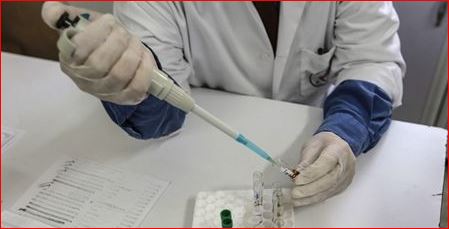Interview : Changchun / Editor : Shang Yan / Publisher : New Tang Dynasty Television
Ref : https://www.ntdtv.com/gb/2020/08/27/a102927807.html
Translation, editing : Gan Yung Chyan, KUCINTA SETIA
Reuters reported on 26 August that the Swedish Public Health Agency stated on Tuesday that a test kit for SARS-CoV-2 from China was wrong, causing 3,700 people to be misjudged as positive.
The agency said that China's BGI Genomics reagents could not distinguish a very small amount of virus from negative results. According to Karin Tegmark Wisell, the head of the Microbiology Department of the Public Health Agency, suppliers must make adjustments to the reagents, which are widely exported to other countries.
Sweden is the most populous country in Northern Europe, and the severity of the covid epidemic is also the highest in Northern Europe. As of August 26, Sweden had a total of 86,891 confirmed cases and 5814 deaths.
This is not the first time that China's export of CCP's pneumonia testing reagents has been reported as wrong. After the Czech, Spain, Turkey, Philippines and other countries purchased quick screening reagents from China, they all reported that the accuracy rate is only 3 to 40%.
Zhu Wei, medical director of a pharmaceutical company in the United States, believes that this incident has made the international community once again question the accuracy of China's nucleic acid reagents.
Zhu Wei said, “Although we know that this genetic test is difficult to be 100% correct, in fact, the excessive false positive rate and false negative rate will lose the significance of virus testing. In fact, it plays a role in the prevention and control of the epidemic. Serious interference. So I think China’s attempt to use the epidemic to expand the export of related testing reagents will have a negative impact."
Radio Free Asia quoted Ren Ruihong, a former executive of the China Red Cross Foundation's critical illness relief project, as saying that "BGI Gene" is known as the top in China, but facts have proved that the level of core technology is far behind the international level. She also warned that the accuracy of the virus test was incorrect. If it is not corrected, the false-positive patient receives medication, which will cause damage to his body's immune system.
But Dr. Xiao En, a former virology researcher at the US Army Research Institute, believes that the technical level of manufacturers is the second reason. The first reason should be the negligence of the guidance and supervision of China's CDC.
Former U.S. Army Research Institute Virology Researcher Dr. Xiao En said, “At that time dozens of Chinese manufacturers emerged in January and February to produce different nucleic acid detection reagents. Of course, BGI can be said to be the leader. So for such a big standard production of these nucleic acid detection reagents by domestic companies, China CDC does not have strict regulations, and the experimental conditions are not strictly regulated. How about quality control? Have the products of these companies been verified by CDC? This in itself is a problem for the government supervision department."
Dr. Xiao En pointed out that, on the other hand, these large companies often have a strong relationship with government departments, which has also caused lax quality supervision.
Dr. Xiao En said, "As long as the government says I want to order yours, the quality is not good, and the domestic government will not pay attention to it. Because the quality is not good, it also meets the political needs of the CCP at that time. Politically, China needs to say, try to make this diagnosis. The number of people is small. Then these companies are making money anyway, and the market is stable. The government guarantees your market. For these companies, quality control becomes not the first thing."
Dr. Xiao En said that, in fact, the accuracy of nucleic acid reagents also exists in China, but the domestic media does not report it. Only after the export reagents have problems, they are exposed.
The Reuters report also pointed out that the two subsidiaries of BGI were blacklisted by the United States for allegedly violating the human rights of the Uighurs. BGI did not respond to this.




No comments:
Post a Comment